For those brave souls who camp year-round and stay in their RV during the cold of winter, it might be necessary to use a heater to keep warm.
Sure, your camper probably has a heating system, but it might be a propane-guzzler or it may not be sufficient to warm your entire RV during the colder nights.
However, propane space heaters are dangerous, whether you’re using them in an RV or a normal home.
In fact, space heaters are the second most common cause of house fires in the U.S., according to the National Fire Protection Association. Worse still, space heaters are the third-leading cause of home fire deaths.
Are propane heaters such as catalytic heaters safe to use in an RV?
Catalytic propane heaters are very energy-efficient and do not have an open flame, so they are safe to use in an RV or camper. However, you need to make sure to purchase a catalytic heater that is specifically designed for use inside RVs. Also, as with any heater, there are safety precautions you should take to prevent fires.
It’s our hope that everyone stays safe (and warm), and so we did the research about catalytic and non-catalytic heaters so that you can know the difference, understand the pros and cons, and more.
In this article, we’ll cover all of this as well as some safety tips so that you can use your heater without fear of burning down the RV with you or your loved ones inside.
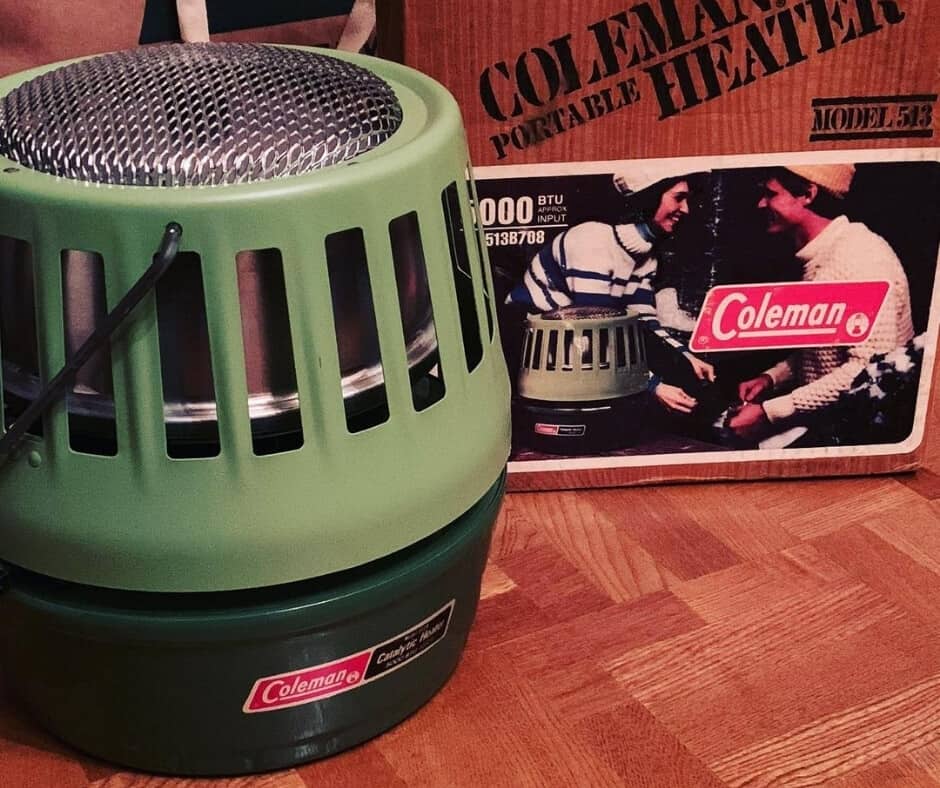
What is a Catalytic Heater?
Catalytic heaters are a type of propane (gas) heater that does not require electricity in order to operate.
This can be advantageous in an RV, so that you can reserve your battery for other uses.
Electric space heaters draw a lot of power from your battery, while catalytic heaters only require propane to fuel the catalytic reaction that produces heat.
What’s more, there’s no open flame with a catalytic heater, and therefore it requires less propane to use.
This is another reason why catalytic heaters are a good choice for heating your RV, since you don’t need to haul extra weight in replacement propane canisters.
Some of the most popular brands that manufacture catalytic heaters include Coleman, Olympian, Mr. Heater and Scott Can.
There are two types of catalytic heaters: portable and mounted.
Portable Catalytic Heaters
If you don’t need a permanent heating solution and you’re just heating your RV for the winter season, a portable catalytic heater might be ideal.
These types of catalytic heaters use disposable/refillable propane tanks, so you can just run it off of your camper’s standard tank using an extension cord.
Mounted Catalytic Heaters
As a permanent heating system, a mounted catalytic heater will need to be installed before you can use it.
Mounted catalytic heaters come in a wide variety of sizes to fit different campers, so you can buy the model suited to your RV’s square footage for the most efficient and effective heating.
The heater will then be connected to your RV or trailer’s propane system to draw directly from it to heat your camper.
Things to Know About Using Catalytic Heaters in an RV
When using a catalytic heater in an RV or travel trailer, there are a few things to keep in mind. Catalytic heaters…
1: Do not require electricity
Unlike a space heater that you plug into the wall, there is no electrical component to catalytic heaters.
These heaters run on low-pressure propane gas, so that when you run low or use up the propane, you can refill it at a gas station.
Catalytic heaters usually have a safety shut-off valve that prevents the heater from leaking fuel accidentally.
2: Do not waste as much fuel
Since they run on low-pressure propane, a catalytic heater is more fuel-efficient than your RV furnace, which uses high-pressure propane and wastes as much as 45%.
In comparison, catalytic heaters are known to be 99.98% efficient, and you won’t affect your RV battery at all when you use it.
3: Are safer than other heaters, but still require safety precautions
Catalytic heaters don’t have an open flame and don’t use high-pressure propane, so they are safer and more energy-efficient than other types of RV heaters.
However, catalytic heaters consume oxygen and burn propane, creating a risk of carbon monoxide poisoning or asphyxiation if you don’t ventilate the room properly.
Some modern propane catalytic heaters have a sensor that detects when oxygen is low, automatically shutting off the flow of propane if oxygen drops below certain levels as a safety precaution.
Regardless, whenever you use a catalytic heater, be sure to crack a window or vent to let additional oxygen in.
Read next: Space Heaters For RV Which Are Safe To Leave On Overnight
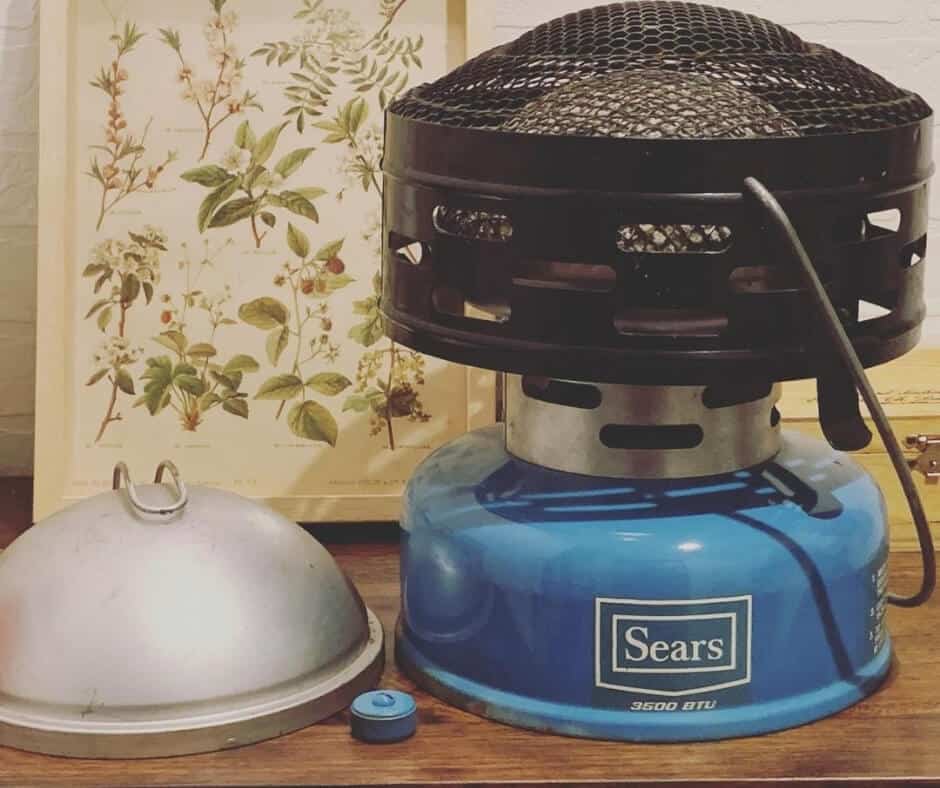
Difference Between Catalytic And Non-Catalytic Heaters
Both catalytic and non-catalytic heaters use propane to operate, but there are some differences with regard to mechanics, efficiency and safety between the two types of heaters.
Non-catalytic heaters are propane-powered heaters that use an open flame or ceramic burner to generate heat, instead of a catalytic reaction.
They are not as fuel-efficient as catalytic heaters, but they’re more efficient than your RV furnace.
Mr. Heater Buddy Heaters are probably the most popular brand of non-catalytic camping heaters, which use a ceramic burner plate to generate heat.
Other non-catalytic heaters emit heat through convection (as hot air rises, the cooler air falls).
Pros of Non-Catalytic Heaters
There are some key benefits of using a non-catalytic heater in your RV:
-
These heaters work without electricity, so they are perfect for dry camping or conserving your RV battery.
-
Non-catalytic heaters are extremely energy- and fuel-efficient, with no soot build-up (clean burning).
-
They are very inexpensive and cheap to operate.
-
Non-catalytic heaters such as Mr. Heater Buddy Heaters warm up fast and can be left on overnight.
-
When working properly, non-catalytic heaters are totally silent.
Cons Of Non-Catalytic Heaters
The drawbacks to using non-catalytic heaters are all based on the type of heating system (propane) and the related risks and safety precautions you’ll need to take when using one.
-
If you don’t properly ventilate your RV, dangerous carbon monoxide gases and lack of oxygen can occur.
-
You have to refill or replace the propane when it runs out (however, this will take awhile because non-catalytic heaters are very fuel-efficient).
-
Non-catalytic heaters only work reliably up to 7,000 feet in elevation, so if you’re camping at higher elevations, there may not be enough oxygen in the air to turn on the heater.
Although non-catalytic heaters don’t emit much carbon monoxide, you should always have a working carbon monoxide detector inside your RV because it uses propane and consumes oxygen.
Pros of Catalytic Heaters
Many of the benefits of using a catalytic heater reflect the same perks of a non-catalytic heater, with a couple of extra caveats.
-
Catalytic heaters also do not use electricity so that you can conserve your RV battery.
-
This type of heater produces the least amount of carbon monoxide of any type of propane heater.
-
One key reason why catalytic heaters are safer than non-catalytic heaters is that there is no open flame once you turn on the heater, reducing the risk of fire
-
Propane goes a long way with the highly efficient catalytic heaters, and there’s no soot build up because propane is a clean burning fuel.
-
The reaction in a catalytic heater means that it heats and combusts more efficiently than any other type of propane heater.
Cons Of Catalytic Heaters
Catalytic heaters have the same drawbacks as non-catalytic heaters, and they are also typically more expensive than other propane heaters.
However, because they are more fuel-efficient, the higher initial cost may be worth it because catalytic heaters will burn propane more slowly than non-catalytic heaters and other LP heaters.
One catalytic heater that is rated for use inside RVs is the Camco Olympian Wave. Based on reviews, it will last longer than the non-catalytic Mr. Heater Buddy Heaters.
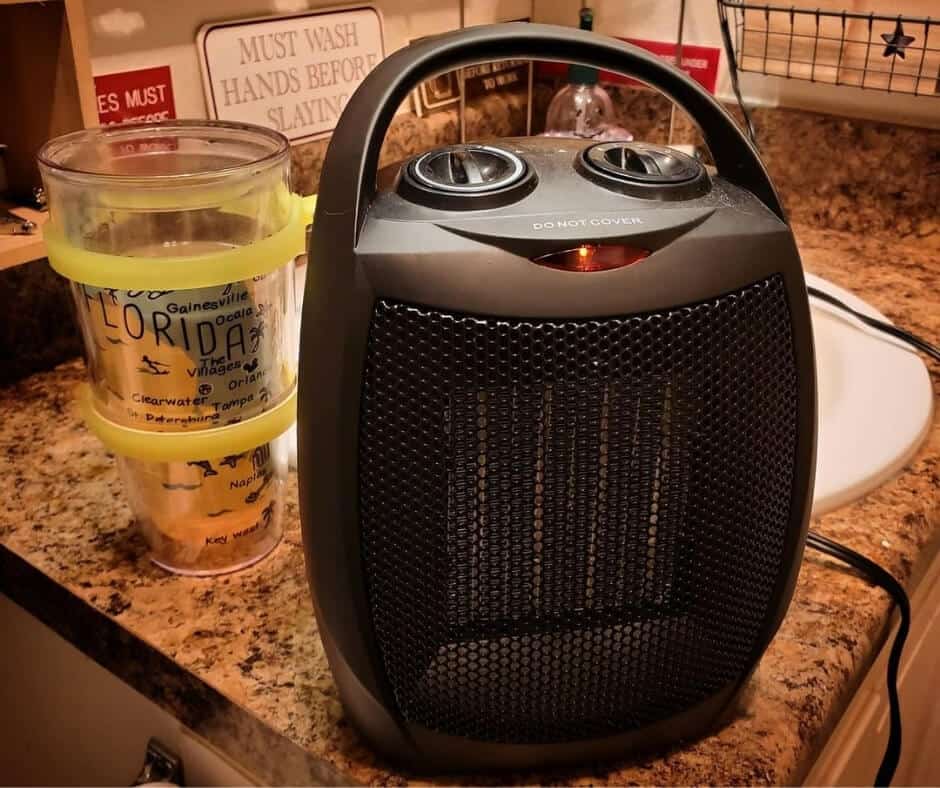
Pros and Cons of Electric Space Heaters
While we’re comparing different types of heaters for campers, we should take a moment to note the pros and cons of using an electric space heater instead, if you so choose.
Some of the benefits of electric space heaters – the kind you plug into the wall – are:
-
There is zero use of propane
-
Effectively heats a small space
-
There’s no chance of carbon monoxide poisoning
-
Most electric space heaters are totally silent when in use
-
More portable than propane heaters
However, there are drawbacks to using an electric space heater, including:
-
The risk of fire is higher with electric space heaters, especially if used incorrectly.
-
The electric space heater can only heat one area at a time (this may not matter, such as if you have a small trailer).
-
Electric heaters draw on your RV’s battery, so it should only be used when you’re hooked up to a campsite and would not be good for dry camping unless you have a generator.
An important thing to note about electric space heaters for use in RVs and travel trailers is the wattage.
Generally speaking, you should only ever use electric heaters rated under 1200 watts for small interiors like those inside a camper.
If your electric space heater happens to have more than 1200 watts, it will put more amps through the outlet.
This is a problem because most outlets are only designed to have about 10 amps passing through them at a time.
By using a heater that’s rated for under 1200 watts, you can keep the amps around or under 10, which is safer and will not cause the outlet to heat up excessively (another fire hazard).
How to Use Non-Catalytic and Catalytic Heaters
Non-catalytic heaters are extremely easy to use, just follow the instructions and take necessary safety precautions, and you’re good to fire it up! Just always make sure to ventilate the space well, and double check to make sure that nothing can accidentally close the ventilation without your knowledge.
That being said, there are some extra things to keep in mind with catalytic heaters, because they work differently than other propane heaters.
Catalytic heaters have a sort of ‘pad’ inside, which is made of platinum. The heater works by combining the propane fuel with oxygen in the room in the presence of a platinum catalyst (which is typically a catalytic pad).
The pad then generates the heat, allowing it to combust at a much lower temperature than a non-catalytic propane heater.
During this reaction, propane and oxygen are converted into heat, water vapor, and carbon dioxide.
It’s completely safe, as long as you keep the space ventilated because an insufficient amount of oxygen can result in harmful carbon monoxide fumes.
Safety Tips for Using Catalytic Heaters in an RV or Camper
A catalytic heater can be a safe and energy-efficient way to heat your RV or travel trailer during the winter or in cold climates. However, there are some specific safety steps to follow:
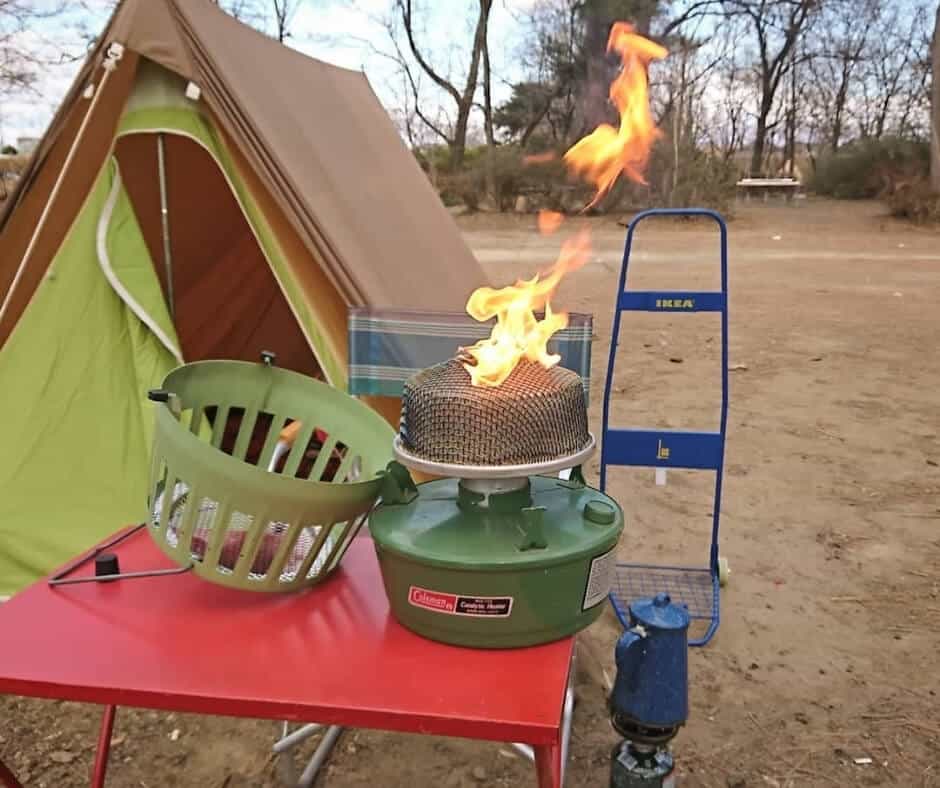
General Propane Heater Safety
Now that I’ve outlined the specific uses and safety tips when using a catalytic heater, I thought it would be helpful to share some general safety tips when using propane heaters. Some of them may surprise you…
Whenever you use an indoor propane heater in your RV or trailer:
Final Thoughts About Catalytic Heaters for Campers
Catalytic heaters are a very fuel-efficient, safe, and functional way to heat your RV or travel trailer during the wintertime or whenever you travel through colder climates.
Whether you choose to use a portable catalytic heater or install a mounted heater in your RV permanently, these types of heaters only use propane and will not draw on your RV’s battery to use.
I hope the comparison of pros and cons about catalytic heaters, non-catalytic heaters and electric space heaters was useful if you’re on the hunt for the right type of heater for your camper.
Regardless of what kind of heater you decide to use, be sure to follow our safety tips and guidelines.
Safe travels, and stay warm!

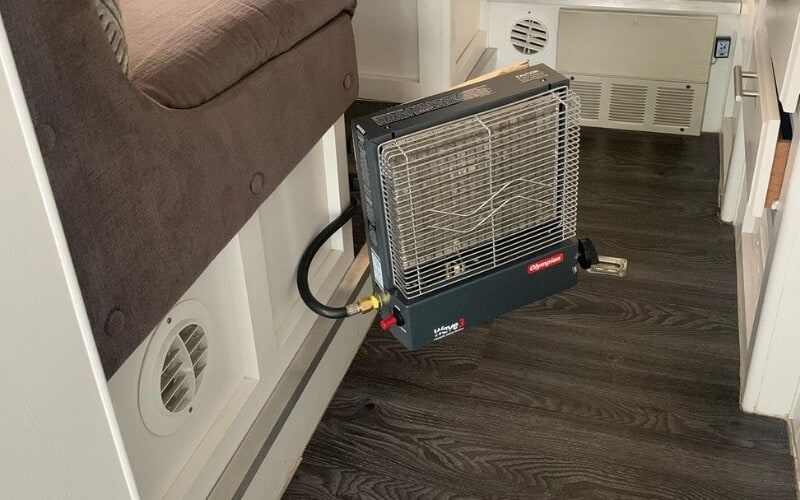
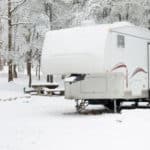

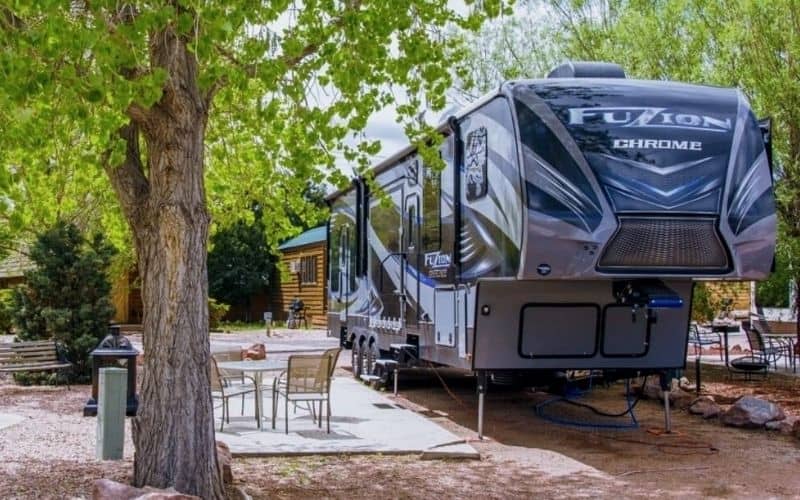
![6 Best Four Season Fifth Wheel RVs for Full-Time Living in [currentyear] 9 Best Four Season Fifth-Wheel Trailers](https://www.rvingknowhow.com/wp-content/uploads/2021/12/Best-Four-Season-Fifth-Wheel-Trailers.jpg)

2 Comments
Robert
1 year agoCATALYTIC HEATERS AREN’T Combustion they are a no flame Chemical reaction
Mr Buddy is a Flame combustion heater
Open flame and a flame pilot light on all the time.
I’m order for propane to create carbon monoxide
It takes combustion
CATALYTIC heater No flame
No combustion
Ever
CATALYTIC heater uses 99.8% efficiency
Mr Buddy non CATALYTIC
Flame heater under 50% efficiency
Not exactly safe nor Frugal
….
Julian F Nurkowski
1 year agoHave you seen documentation of the efficiency of RV catalytic heaters running on propane? I’ve heard comments that the efficiency of catalytic heaters using methane are 95%+ but when we performed measurements, the efficiency was approximately 85%. I would expect using propane would improve the efficiency, but 99.9% seems like a stretch!